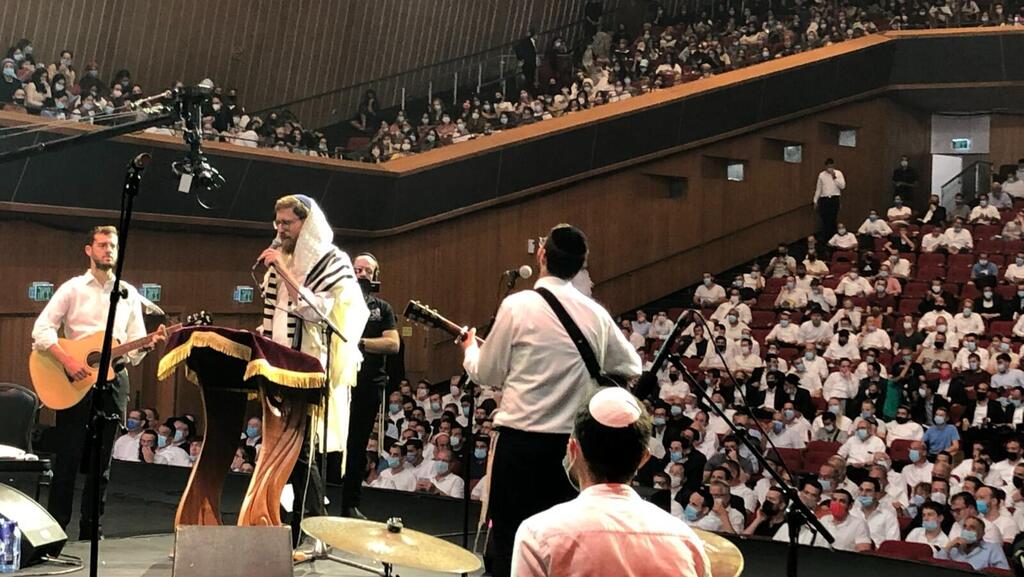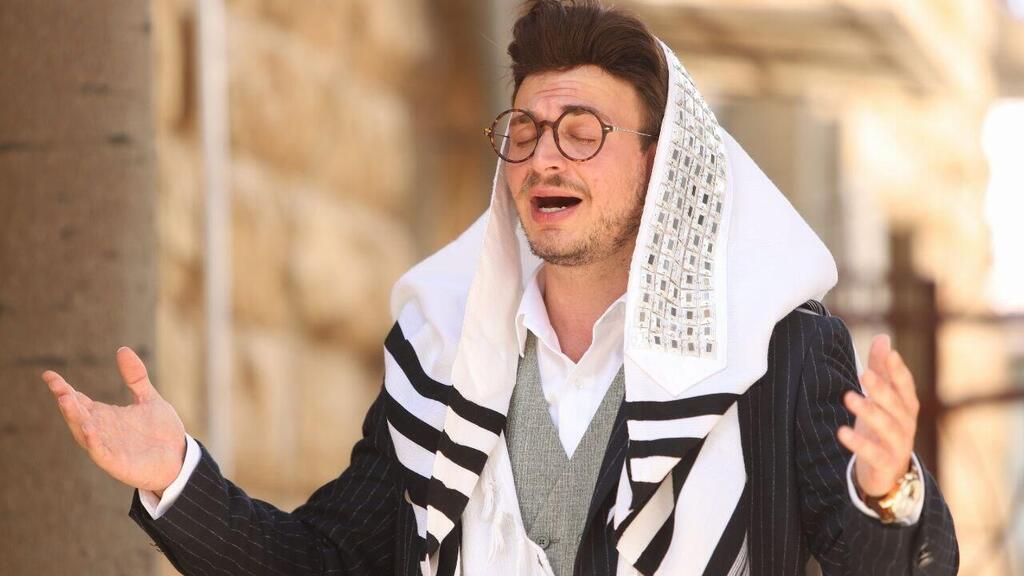Haneshama Lach (The soul is yours), Zalman Stub
(Gil Yochanan)
Ynetnews featured a musical Selichot evening that combined liturgical poems, Tishrei songs and prayers led by musician and cantor Zalman Stub at Kehilat Renanim Synagogue in Hechal Shlomo in Jerusalem; cantor and singer Yitzchak Meir from the International Convention Center in Jerusalem - and Rabbi Esteban Gottfried, cantor Atalya Lavi, singer and liturgical poet Morin Nehedar and the musicians of Beit Tefilah Israeli from the Tel Aviv Port.
More stories:
The First Selichot (a traditional service) led by Yitzhak Meir, accompanied by musical instruments - as well as those led by Zalman Stub in the style of Rabbi Shlomo Carlebach.
2 View gallery


Selichot services with Yitzchak Meir at the International Convention Center in Jerusalem
(Photo: Yishai Yerushalmi)
Mizrachi Jews started reciting Selichot prayers daily from the beginning of the Hebrew month of Elul. Ashkenazi Jews join them in saying these special piyutim and prayers nightly, beginning after the conclusion of Shabbat and continuing until the eve of Yom Kippur.
From Slouqi to the International Convention Center in Jerusalem
For the 16th consecutive year, cantor and singer Yitzchak Meir performed the Selichot service, accompanied by a range of musical instruments. The event, set to take place at the International Convention Center in Jerusalem, featured his brother Israel on guitar, Niv Klil Hahoresh on flute and Neria Eden on percussion.
Yitzchak Meir
"After studying at the ultra-Orthodox Mir and Hebron yeshivas, I enlisted in the army and joined the 932nd Battalion of the Nahal Brigade," he shared with Ynet this week. "In the summer of 2006, the Second Lebanon War erupted and we were deployed in Slouqi, among other locations. After the war, the Selichot period arrived and I felt the need for introspection, for us to come together as a group. I suggested to my army friends, 'Let's perform Selichot with music.' We never considered hosting it in a synagogue, so we reached out to Eliyahu Bezalel, the director of the organization in Jerusalem.
"Immediately after a lecture, we started with musical instruments. I did not imagine that this would happen year after year, and we would have to wander between different places, because there was no place for everyone who wanted to come. The demand kept growing, and a few years ago someone called to ask me if I would be offended if they did a Selichot with musical instruments in another place."
And what did you answer?
"I answered with a question - "What, I own the Jewish heart and the connection to the Holy One, blessed be He? It excites me that this is happening in other places and that Jews are taking responsibility for their connection, for praying to God.
What is your attitude toward the rabbis who oppose changes and the introduction of musical instruments into the synagogue?
"I actually got to talk to a number of well-known rabbis who backed me. But I am aware that there are rabbis who think differently and I thank them. I don't want there to be someone who, God forbid, would be considered strange if he said Selichot like before, which is what would happen if everyone held Selichot with musical instruments.
"These are the words of the living God, and I am happy for the opportunity to once again turn the International Convention Center into a synagogue, in front of 2,700 people. I also thank the Jerusalem Municipality for holding the event because, thanks to them, I am making history - to be the only artist ever to appear in the International Convention Center on stage, in front of the holy ark and with his back to the audience," he says with a smile.
'The heart awakens in the synagogue space'
The last stop on Selichot night was at the Kehilat Renanim Synagogue in Hechal Shlomo in Jerusalem with musician Zalman Stub. "If you look at prayer, you can see that there is a paradox: On the one hand, its purpose is to connect, and on the other hand, we put fixed words in our mouths that others have decided are the right words. How can we deal with such a problem? One of the ways is a song of prayer. Music gives a dramatic touch, You mix the text together with the soul, and suddenly we have our place within their words," according to Stub.
2 View gallery


Musician Zalman Stub performs the Selichot service in the style of Rabbi Shlomo Carelbach
(Photo: Daniel Nafusi)
What is the advantage of playing with musical instruments?
"Musical Selichot bring together hundreds of people who want to feel, but don't know how. The texts of the Selichot are full of chants, and if we didn't study them and put serious thought into understanding the meaning of the words, then we read a text, shouted a little in the wee hours of the night or in the early hours of the morning, and continued on to bed."
"So it's true, even with Selichot like I do - the musicality - the text still disappears and those who want to understand have to learn. But the heart awakens and you can almost touch this special compound in the space of the synagogue, words floating in the air next to soaring souls."
First published: 21:30, 09.07.23



